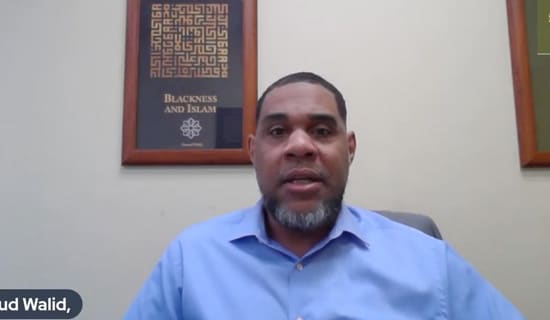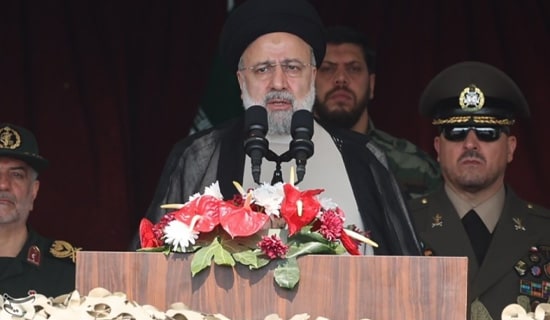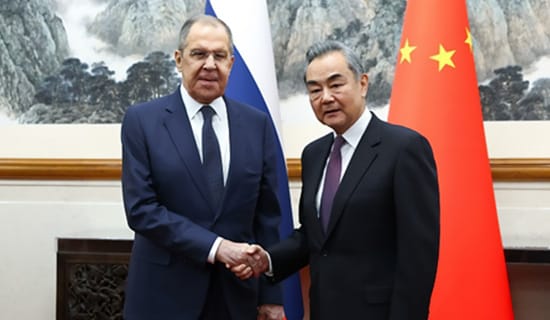Russia This Week is a new weekly review by the MEMRI Russian Media Studies Project, covering the latest news and analysis relating to Russia from media in Russia, the Caucasus, Central Asia, and Eastern Europe.
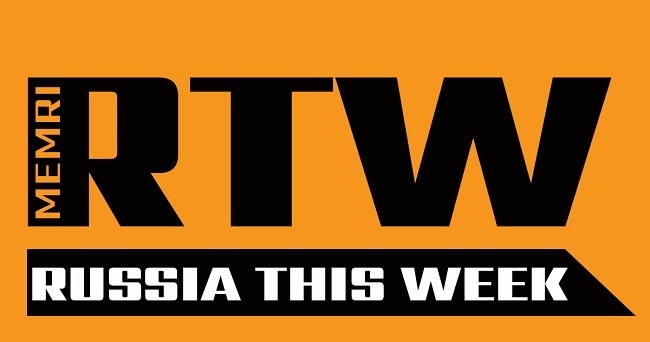
Cartoon Of The Week

(Source: Vk.com/13studiya, VitalyPodvitsky, May 25, 2016).
Ukrainian pilot Nadyia Savchenko, who was recently freed in Russia, is portrayed as a dog.
On the t-shirt: "Aidar", name of a Ukrainian battalion, took part in the war in Eastern Ukraine against pro-Russian separatists.
Next to Savchenko: "Now you'll see what it means when you have a bitch set free"
Zakharova Dixit
Russian Foreign Ministry spokesperson Maria Zakharova is one of the most-quoted Russian officials. She is known for using colorful language when describing Russian foreign policy in her weekly press briefings. The following are Zakharova's quotes of the week:
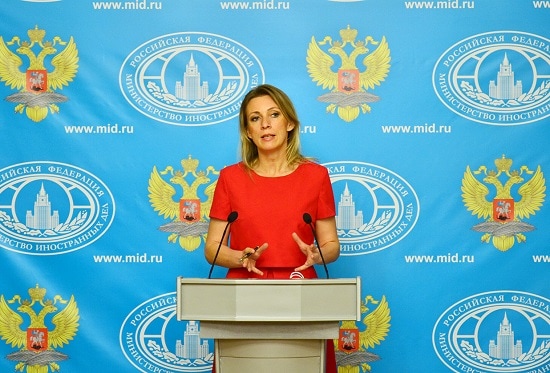
(Source: Mid.ru)
"NATO is building up its activity everywhere. I believe there is no place on the map where the North Atlantic bloc has not built up its activity. First, the biggest problem is not that it is building up its activity, which is its mission, but that it is doing so in the regions where nothing threatens it or its member states. Second, another problem is that NATO is not building up its activity where a threat exists. This is the biggest mystery. Why is it not working to deal with real threats or to increase its capacities to fight against, say, terrorism?"
(Mid.ru, May 26)
Quotes Of The Week:
Deputy Chairman of the Federation Council Committee on Defense and Security, Franz Klintsevich, said: "They [the U.S. and NATO] just cannot get used to the idea that there are other independent centers of world power beside them. Reverting to a unipolar system, in which only one country decides for the entire world, is now unthinkable."
(Regnum.ru, May 23)
The President of the International Center for Geopolitical Analysis, Ret. Colonel General, Leonid Ivashov, said: "The U.S. faces two main international challenges: the E.U. and China. By forcing the E.U. to spend more money on security, the U.S. is weakening the E.U. economically. The [U.S.' real] goal is to colonize the E.U. markets. [emphasis ours] From the U.S. perspective, this goal [of 'colonizing' the European market] justifies all means including the Islamization of Europe and fomenting tensions between NATO and Russia."
(Tass.ru, May 23)
In The News
Russia-NATO Relations: Putin Warns Romania And Poland That Hosting NATO Ballistic Missile Defense Systems Puts The Two Countries In Russia's "Cross-Hairs"
During a visit to Greece intended to mend ties between Russia and the E.U., Russian President Vladimir Putin said that Russia will target Romania, which has recently opened a NATO ballistic missile defense base, and Poland, which plans to do so by 2018. Putin said: "If yesterday people simply did not know what it means to be in the crosshairs in those areas of Romania, then today we will be forced to carry out certain measures to ensure our security. And it will be the same with Poland...At the moment the interceptor missiles installed [in Romania] have a range of 500 kilometers, soon this will go up to 1000 kilometers, and worse than that, they can be rearmed with 2400km-range offensive missiles even today, and it can be done by simply switching the software, so that even the Romanians themselves won't know... We have the capability to respond. The whole world saw what our medium-range sea-based missiles are capable of [in Syria]. But we violate no agreements. And our ground-based Iskander missiles have also proven themselves as superb...NATO fends us off with vague statements that this is no threat to Russia... That the whole project began as a preventive measure against Iran's nuclear program. Where is that program now? It doesn't exist...We have been saying since the early 2000s that we will have to react somehow to your moves to undermine international security. No one is listening to us.'
(Rt.com, May 28)
(See MEMRI Special Dispatch,Official Russian Campaign Against NATO's Ballistic Missile Defense System in Europe - Part I, May 16, 2016. See also MEMRI Special Dispatch,Official Russian Campaign Against NATO's Ballistic Missile Defense System In Europe - Part II, May 17, 2016; See also MEMRI Videoclip,Anger in Russian Media at U.S. Missile Defense System in Romania NATO Base - Military Expert Talks about Possibility of Use of Tactical Nuclear Weapon against System, May 10-16, 2016)
Ahead of NATO summit in Warsaw next July, Polish schoolchildren will start learning about NATO along with national history and civic studies.
(Rt.com, May 23)

Sputniknews.com,
VitalyPodvitsky, May 23, 2016.
Polish children learn that a NATO tank is a member of their family.
Russia-EU Relations: Putin: "Harmonizing European And Eurasian Integration Processes Would Be An Important Step"
During a visit to Greece intended to mend ties with between Russia and the E.U., Russia's President Vladimir Putin met with Greece's Prime Minister Alexis Tsipras. During the press conference, Putin said: "We [Russia and Greece] must translate the exceptionally good mutual relations and mutual sentiments of the two peoples into economic growth and cooperation - not only in the energy sector, but also in high-technology industries and infrastructure. These, of course, should be mutual investments."
(Kremlin.ru, May 27)
Greece's Prime Minister Alexis Tsipras said that "European security cannot be achieved without cooperation and dialogue with Russia," and that he does not believe that Europe "can move forward or ensure compliance with international law while caught in a vicious circle of sanctions, militarization and Cold War rhetoric."
(Rt.com, May 27)
Ahead of his visit to Greece, the Greek newspaper Kathimerini published an article by Vladimir Putin, titled "Russia And Greece." In the article, Putin discusses Russia-E.U. relations, stressing the need to foster a European and Eurasian integration. Putin writes: "Russia proceedes from the need to establish dialogue with the E.U. in the spirit of equality and genuine partnership...However, we do not yet see our European colleagues' willingness to follow such a mutually beneficial and promising path. Nevertheless, we believe that our relations with the E.U. do not face any problems that we cannot solve...Today, Russia and the E.U. have come to a crossroads, [emphasis ours] where we need to answer the following question: how do we see the future of our relations and which way are we heading? I am convinced that we should draw appropriate conclusions from the events in Ukraine and proceed to establishing, in the vast space stretching between the Atlantic and the Pacific Oceans, a zone of economic and humanitarian cooperation based on the architecture of equal and indivisible security. Harmonizing European and Eurasian integration processes would be an important step in this direction."
(Kremlin.ru, May 26)
In an interview to Russia's state-owned Rossiyskaya Gazeta, State Duma Foreign Affairs Committee head Aleksey Pushkov said: "From a political point of view, the E.U. made a huge mistake in admitting [Eastern European] countries as [member states]. The elites which came to power in those countries after the fall of the Soviet Union perceive the geopolitical game against Russia as the main goal. It's part of their self- identification. If the Estonian, Latvian or Lithuanian policy was deprived of the Russophobia component, what would be left? [emphasis ours] The governments of those countries exploit the fact that they have a common border with Russia in order to be a priority for the U.S. and NATO..."
SUPPORT OUR WORK

(Rg.ru, May 24)
Russian commentator Lubov Lulko said that Russia needs to support European politicians from the oppositions such as French politician Marine Le Pen. Lulko wrote: "We need to promote anti-U.S. European politicians in our universities and support local pro-Russia new politicians. Russian security services need to work in Europe by fostering 'color revolutions' [referring to the Orange Revolution in Ukraine and the Rose Revolution in Georgia that ousted pro-Russian leaders] [so that] if the [political] situation is going bad in their [countries], the Europeans won't have time to mess with us." Lulko further elaborated on the issue, saying that there are good prospects for instability in Europe. According to the Russian commentator, the Greek crisis and the economic problems in Portugal and Spain are all favorable factors for Russia.
(Pravda.ru, May 23)
Russia's Deputy Prime Minister Dmitry Rogozin:"Sanctions [against Russia]...won't be the same as now -because Europe cannot afford to maintain bad relations with Russia."
(Ria.ru,May 24)
Russia-U.S. Relations: Ret. Gen. Leonid Ivashov: "When The Americans Sense A Threat As in 1962, They Will Propose That We Sit At The Negotiation Table"
The President of the International Center for Geopolitical Analysis, Ret. General Leonid Ivashov said: "We should realize that the Americans stand behind... the anti-Russian hysteria and NATO's military build-up. Thus, we should create a military group, which would be able to work in the U.S. territory. The U.S. is actively developing its air defense system in order to neutralize our intercontinental ballistic missiles. So, we should create a group of precision-guided tools. Cruise missiles should be deployed within striking distance in close proximity to U.S. territory. The American air defense can also be neutralized in such a way. A real threat to the US, which is a mastermind of all of these processes, should exist. When the Americans sense a threat as in 1962 [during the Cuban missile crisis], they will propose that we sit at the negotiation table" [emphasis ours].
(Pravda.ru, May 20)
Russia And Ukraine: Zakharova: "The Savchenko Case Is Not Linked To The Minsk Agreements."
Ukraine's President Petro Poroshenko appointed former NATO secretary-general Anders Fogh Rasmussen as his non-staff advisor.
(Sputniknews.com, May 27, 2016)
On May 25, Ukrainian pilot Nadyia Savchenko, 35 years old, was freed by Russia as part of a swap for two Russian citizens jailed in Ukraine. Savchenko was captured, while fighting against pro-Russian separatists in eastern Ukraine in June 2014. Following her release, Savchenko declared that she is prepared to become Ukraine's President. "Ukrainians: if you need me to become your president, then I will be president," said Savchenko at the first press-conference since she arrived in Ukraine.
(Themoscowtimes.com, May 27)

Vk.com/13studiya,
Vitaly, May 27
Ukrainian Prime Minister Volodymyr Groysman: Petya [diminutive for Petro, referring to Ukrainian President Petro Poroshenko] maybe we committed a mistake when we placed this Savchenko sparrow so high up?
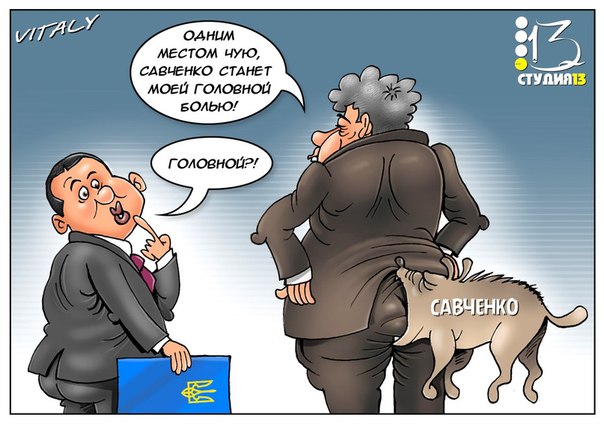
Vk.com/13studiya,
Vitaly, May 26, 2016
On the dog: Savchenko
Ukrainian President Petro Poroshenko: "I've got the gut feeling that Savchenko will become a headache for me.
Ukrainian Prime Minister Volodymyr Groysman: Head?!
Commenting on Savchenko's release, Russian Foreign Ministry spokesperson Maria Zakharova said that "the Savchenko case is not linked to the Minsk Agreements [that enjoins the release and exchange of all hostages and illegally held persons]"
(Mid.ru, May 26)
Russia And The G7 Summit
The G7 gathered in Japan for the Ise-Shima summit on May 26-27.
See MEMRI Special Dispatch, Renowned Russian Intellectual Fyodor LukyanovOn Valdai Discussion Club Website: 'The End Of The G8 Era: Russia Does Not Need Western Hierarchy', May 11, 2016.
Ahead of the G7 meeting in Japan, State Duma Foreign Affairs Committee head Alexey Pushkov commented on U.S. President Barack Obama's visit to Hiroshima on May 27. Pushkov wrote on his Twitter account: "Nobel Laureate Obama is not going to apologize for U.S. atomic bombings on Japan.[Obama] talks about humanism for dumb asses. Obama [proved himself to be] the worthy successor of [U.S. President Harry] Truman."
(Lenta.ru, May 22)
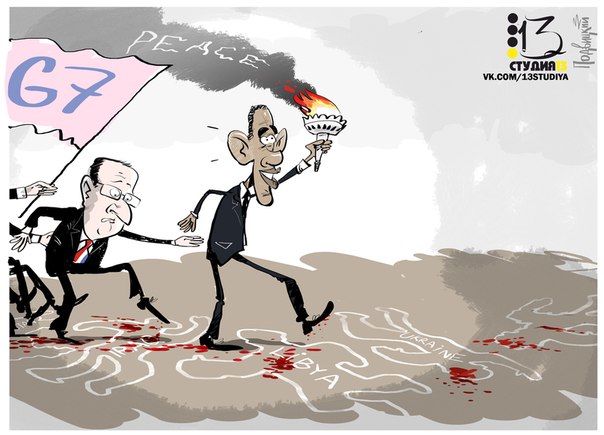
Vk.com/13studiya,
VitalyPodvitsky, May
27
G7 members led by U.S. President Barack Obama steepping over the corpses of victims in Libya and Ukraine, while pretending to talk about peace.
Russia's Economy: Putin: "If We Do Not Find New Sources of Growth, We Will See GDP Growth Of Around Zero"
Russian economist and senior economic assistant to the President of Russia, Andrey Belousov, said that Russia could afford to spend an additional 50-100 billion rubles ($767 mln - $1.53 bln) from Russia's National Wealth Fund on investment projects in case oil prices stabilize at $40 per barrel.
(Tass.ru, May 26)
Belousov also said that the Russian government cannot sell the stake of the state-owned oil company Rosneft on the public market. According to Belousov, selling the stake to two strategic investors would be the best way to privatize the company.
(Tass.ru, May 26)
Belousov claimed that the current Russian economic model imposes a 1-2% ceiling on annual growth. Furthermore, Belousov noted the existence of a budget deficit and that an additional 5 million people had recently fallen beneath the minimum wage level.
(Echo.msk.ru, May 25)
May, 25. Russian President Vladimir Putin held a meeting of the Economic Council Presidium to examine sources of growth for Russia's economy through 2025. Putin said that most experts agree that "the Russian economy has stabilized." He then added: "the current dynamic shows us that the reserves and resources that served as driving forces for our economy at the start of the 2000s no longer produce the effects they used to. I have said in the past, and want to stress this point again now, economic growth does not resume entirely on its own. If we do not find new sources of growth, we will see GDP growth [rates] of around zero, and then our possibilities in the social sector, national defense and security, and in other areas, will be considerably lower than what we require to really develop the country and make progress."
(Kremlin.ru, May 25)
Commenting on the meeting of the Economic Council Presidium, the Russian daily Moskovskij Komsomolets said that the meeting was held in the National Security Council room that is always off limits to journalists. Aside from Putin's opening remarks, the meeting was barred to journalists The Russian daily also mentioned that the former Russian minister of finance Alexey Kudrin attended the meeting, but still bore the title of dean of the economic faculty at St. Petersburg University, although he was recently appointed deputy chair of the president's economic council.
(Mk.ru, May 25)
LGBT Rights in Russia
According to a report published by the Russian LGBT Network Lgbtnet.org, in 9 regions of the Russian Federation 52 physical attacks against LGBT people were registered in 2015. According to Lgbtnet.org, in most cases the Russian police refused to open official investigations against the attackers.
(Lgbtnet.org)
The Weekly Point Of View

(Source: M.rus.delfi.lv, May
25)
In a lecture that he delivered in Latvia on Russian politics, editor-in-chief and moderator at the liberal Echo of Moscow radio station, Alexei Venediktov, said that the Russian President Vladimir Putin views the world as black and white: there are enemies (NATO and the West) and there are friends (Eastern Europe and former Soviet republics). According to Venediktov, according to Putin the world enjoyed stability solely because in the post WWII settlement, the USSR and the U.S. divided it into their spheres of influence. However, following the fall of the Berlin wall in 1989, everything went wrong (i.e. terrorism, migrations, etc.). Putin's foreign policy is not aimed at restoring the USSR, but creating Russian zones of influence that will form the basis of a new Russian imperial idea. Venediktov predicts that Putin's immediate successor will be Russian Prime Minister Dmitry Medvedev.
(M.rus.delfi.lv, May 25)
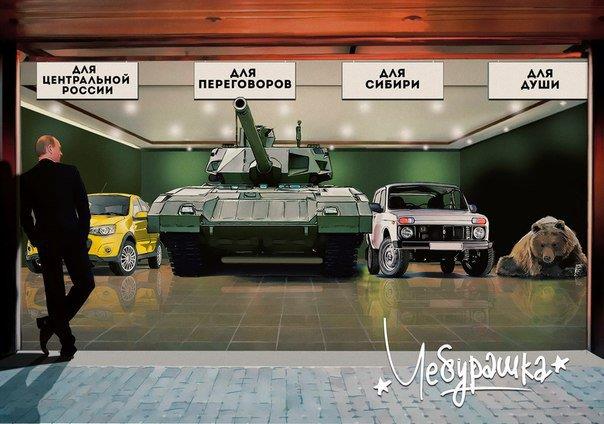
Twitter.com/sharzhipero, May
22, 2016.
Putin's garage:
Family car: for Central Russia
Tank: for negotiations
Russian SUV: for Siberia
Bear: for the soul
Strange But True
Evgeny Tunik, who heads the Institute for Analysis of Political Infrastructure, advised Russian Prime Minister Dmitry Medvedev, to bar Russian officials, including ministers and the CEO/Governor of Russia's Central Bank, from issuing predictions on ruble rates and currency fluctuations. Tunik said that this measure would prevent the Russian population from being "manipulated" to the advantage of interest groups.
(Ria.ru, May 26)
Russia's Supreme Court has approved a bill that makes an insult to Russia's national anthem a criminal offense and sets a prison sentence of one year as the maximum penalty for violators of the new law.
(Rt.com, May 24)
In the Moscow region, a local retired social activist wrote to U.S. President Barack Obama asking him to apply pressure on Russia to extend the gas pipelines to a number of small villages in his region. Many local residents (the majority of them elderly people, including WWII veterans) cannot afford to buy charcoal to heat their houses.The activist has been invited to a meeting at the U.S. embassy in Moscow.
(Mk.ru, May 23)
See previous MEMRI RTW's reviews published in May:
· Russia This Week - May 16-23, 2016
· Russia This Week - May 9-16, 2016
· Russia This Week - May 2-9, 2016
Follow the MEMRI Russian Media Studies Project on Facebook and Twitter.


